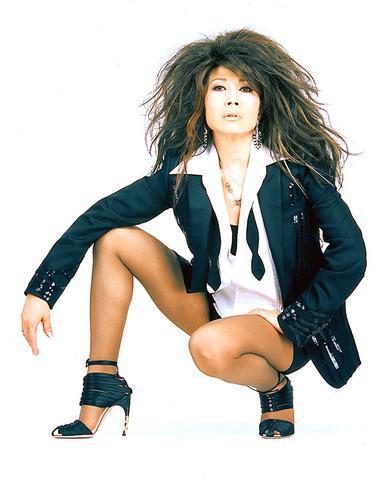She's like the Taiwanese Cher but with a lot more syllables in her name. Tonight and tomorrow night Ouyang Fei-fei (歐陽菲菲), the Taiwan-born "disco queen" of Japan plans to grace the Taipei stage with her "Dazzling Concert 2004" (目炫神迷演唱會).
The sultry disco-cum-pop diva's family name is unusual but a long line of artists have shared it, including the likes of Ouyang Xun, the great calligrapher of the Tang Dynasty, and Ouyang Xiu, a famous poet of the Song Dynasty, to name but two.

PHOTO COURTESY OF KHAM
Even with such tough acts to follow, Fei-fei has laid down some impressive tracks of her own and it was more than just her four-character name that caught the eye of a Japanese agent in 1971.
Her sexy sound would make her Japan's queen of dance. In 1975 she held the first-ever solo Mandarin concert in Hong Kong and again in 1980 when she became the first singer to perform a solo concert in Taiwan.
It would be 23 years before Fei-fei returned to the Taiwan stage, when in February of last year she made an explosive comeback at the Sun Yat-sen Memorial Hall with her "Extraordinary Comeback Concert 2003" (菲常再現演唱會). Both shows sold out, proving that Fei-fei hadn't lost her place in the hearts of her Taiwanese fans.
Fei-fei arrived at CKS International Airport on Tuesday after departing from a very rainy Tokyo. Thankfully, she brought her lucky pet dog with her, and the plane took off without any hold-ups, a Chinese-language report said.
Coming off the plane behind Fei-fei were her backing crew -- including her lighting supervisor, stage designer and sound person -- who are making their second trip to Taiwan with Fei-fei.
According to the report, Fei-fei spoke to her crew members in Japanese, saying that the Taiwanese audience isn't always as "high" as it was during last year's concert (last year it gave a standing ovation and demanded an encore), but as long as everybody gave their best, the audience would be sure to give their approval. Approval is probably a modest estimate for the reception Fei-fei will get this weekend.
This year's concert will include many of the same songs as last year's, but will also give fans an opportunity to hear more of Fei-fei's Japanese hits.
"I hope this year's concert will be even more of a success than last year's," said Fei-fei, promising that the audience would be treated to spectacular new lighting, stage setup and special effects, the details of which will remain secret until the curtain goes up tonight. She intends to live up to her reputation as a "concert goddess" and will be bringing her band and backing crew over from Japan.
Her easy yet powerful presence on the stage is little short of seductive and it's safe to say that tonight's and tomorrow's concert-goers will be positively moonstruck.
Performance notes:
What: Ouyang Fei-fei's Dazzling Concert 2004 (
Where: Taipei International Convention Center (
When: Tonight and tomorrow night (Oct. 9 and 10) at 7:30pm
Tickets: Priced between NT$1,000 and NT$3,000. Available from Kuang Hong Arts (

Taiwan has next to no political engagement in Myanmar, either with the ruling military junta nor the dozens of armed groups who’ve in the last five years taken over around two-thirds of the nation’s territory in a sprawling, patchwork civil war. But early last month, the leader of one relatively minor Burmese revolutionary faction, General Nerdah Bomya, who is also an alleged war criminal, made a low key visit to Taipei, where he met with a member of President William Lai’s (賴清德) staff, a retired Taiwanese military official and several academics. “I feel like Taiwan is a good example of

March 2 to March 8 Gunfire rang out along the shore of the frontline island of Lieyu (烈嶼) on a foggy afternoon on March 7, 1987. By the time it was over, about 20 unarmed Vietnamese refugees — men, women, elderly and children — were dead. They were hastily buried, followed by decades of silence. Months later, opposition politicians and journalists tried to uncover what had happened, but conflicting accounts only deepened the confusion. One version suggested that government troops had mistakenly killed their own operatives attempting to return home from Vietnam. The military maintained that the

Before the last section of the round-the-island railway was electrified, one old blue train still chugged back and forth between Pingtung County’s Fangliao (枋寮) and Taitung (台東) stations once a day. It was so slow, was so hot (it had no air conditioning) and covered such a short distance, that the low fare still failed to attract many riders. This relic of the past was finally retired when the South Link Line was fully electrified on Dec. 23, 2020. A wave of nostalgia surrounded the termination of the Ordinary Train service, as these train carriages had been in use for decades

Lori Sepich smoked for years and sometimes skipped taking her blood pressure medicine. But she never thought she’d have a heart attack. The possibility “just wasn’t registering with me,” said the 64-year-old from Memphis, Tennessee, who suffered two of them 13 years apart. She’s far from alone. More than 60 million women in the US live with cardiovascular disease, which includes heart disease as well as stroke, heart failure and atrial fibrillation. And despite the myth that heart attacks mostly strike men, women are vulnerable too. Overall in the US, 1 in 5 women dies of cardiovascular disease each year, 37,000 of them